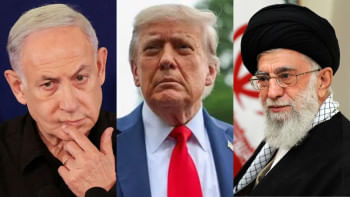Islam misused deliberately
Jamaat and its the then student wing Islami Chhatra Sangha had misused the religion and worked against the sanctions of the Holy Quran and Hadiths by committing crimes against humanity during the Liberation War in 1971, the International Crimes Tribunal-1 said.
Jamaat-e-Islami's notorious student wing was renamed Islami Chhatra Shibir after the war.
The two had functioned as “communal” as well as “criminal” organisations to implement the plan and design of the Pakistan army, which resulted in the killing of innumerable unarmed civilians and Bangalee intellectuals in 1971, it said.
The tribunal in its verdict in the case against Jamaat chief Motiur Rahman Nizami said the accused had consciously and deliberately misused the name of the Almighty Allah and the holy religion Islam in 1971 to ruin and root out the Bangalee nation.
Jamaat was established by the highly controversial Abul Ala Moududi in 1941. Though Moududi opposed the very creation of Pakistan, after the division of the Indian sub-continent, its leaders started claiming themselves the vanguard of Islamic revolution, it said.
The court said there was no denying that Nizami was the then leader of Islami Chhatra Sangha. He had education in Islamic religion and he was the writer of several Islamic books.
In his book titled “Rajnaitik Swarthe Dharma versus Dharm Bhittik Rajniti” (Religion in political interest versus religion-based politics), he depicted Islam's attitude towards non-Muslims.
The ideological belief of Nizami presented in the book was in consonance with the directives of the Medina Charter, the court said.
“But when we go back to fateful 1971, the year of Liberation War, we find quite the opposite picture in the deeds and thoughts of the accused and his associates, including Professor Ghulam Azam, the then ameer of Jamaat-e-Islami,” it added.
The court said on perusal of reports published in the Daily Sangram in 1971, it was evident that Nizami, Ghulam Azam and other Jamaat leaders used to deliver speeches to their followers publicly “using religion in their party politics, giving wrong interpretation of Islam with the intent to incite the young generation into countering freedom fighters and pro-liberation Bangalees, treating them as enemies of Islam.”
In the context of the war, the “wrong messages”, namely "Pakistan is the house of Allah", "Hindus are always enemies of Muslims", and "Islam and Pakistan are one and indivisible", were infused in the minds of the young members of Razakar and Al-Badr Bahini as truth, it said.
“And on being inspired by those propaganda in the name of Islamic ideology, they committed more atrocities vigorously in collaboration with the Pakistan occupation forces. The citations above are the classic instances of misuse of Islam in politics in the name of protecting Pakistan,” it added.
The court said, “It is found from the facts of common knowledge that Islam teaches us to be non-communal and pure in thoughts, words and deeds but during the War of Liberation, the leaders of Jamaat-e-Islami taught its followers to be communal in thought, words and deeds and also treating non-Jamaat-e-Islamis as bad Muslims and the freedom-fighters as miscreants.”
“In view of the above, we have no hesitation to hold that during the Liberation War in 1971 the offences as crimes against humanity, namely murder, extermination, torture, rape, arson and other inhuman acts committed by Jamaat-e-Islami, Islami Chhatra Sangha, Al-Badr and Razakar forces are absolutely against the sanction of the Holy Quran and Hadiths,” the court said.
The court said Nizami violated the injunctions of the Quran and traditions of the Prophet in forming Al-Badr and commanding, supporting, and encouraging the force to kill Bangalee intellectuals and pro-liberation people.
He also did the same misdeeds by providing moral support and endorsing the barbaric activities of Pakistan army, the court said.
In the verdict, the court once again termed Jamaat-e-Islami a criminal organisation for its role in 1971, like it had done in its verdict in Ghulam Azam's case.
That court's observation in July 2013 had intensified the pro-liberation people's demand to try Jamaat for its 1971's crimes and the investigation agency of the International Crimes Tribunal began probing the party in August last year.
The probe agency in March this year submitted a report recommending banning the party and confiscating its properties but the preparation for filing a case remains stalled for months.
The lack of clear-cut provisions for punishing any organisation in the International Crimes (tribunals) Act, 1973 is considered a major obstacle to trying Jamaat.
Meanwhile, Law Minister Anisul Huq said the draft for amending the act would likely be placed before the cabinet meeting for its approval on November 3.

 For all latest news, follow The Daily Star's Google News channel.
For all latest news, follow The Daily Star's Google News channel. 



Comments